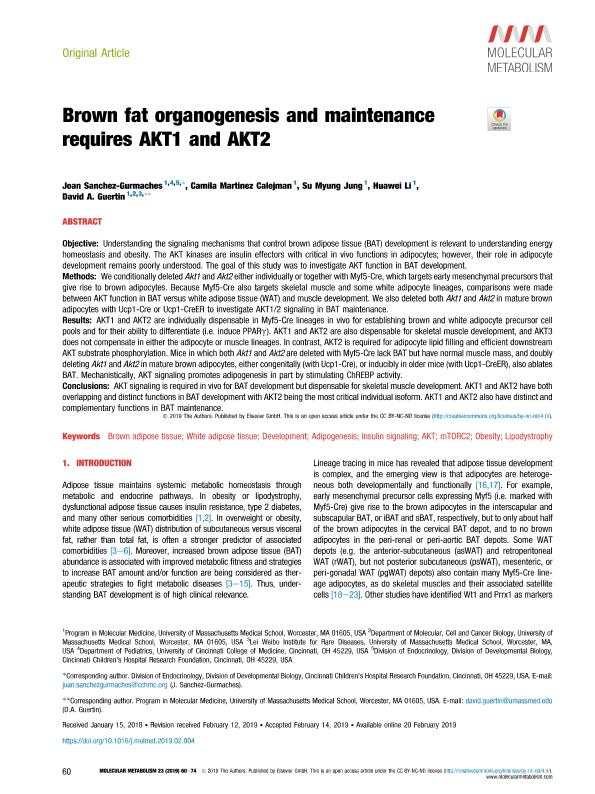Mostrar el registro sencillo del ítem
dc.contributor.author
Sanchez Gurmaches, Joan
dc.contributor.author
Martinez Calejman, Camila

dc.contributor.author
Jung, Su Myung
dc.contributor.author
Li, Huawei
dc.contributor.author
Guertin, David A.
dc.date.available
2022-08-02T10:28:22Z
dc.date.issued
2019-05
dc.identifier.citation
Sanchez Gurmaches, Joan; Martinez Calejman, Camila; Jung, Su Myung; Li, Huawei; Guertin, David A.; Brown fat organogenesis and maintenance requires AKT1 and AKT2; Elsevier Gmbh; Molecular Metabolism; 23; 5-2019; 60-74
dc.identifier.issn
2212-8778
dc.identifier.uri
http://hdl.handle.net/11336/163797
dc.description.abstract
Objective: Understanding the signaling mechanisms that control brown adipose tissue (BAT) development is relevant to understanding energy homeostasis and obesity. The AKT kinases are insulin effectors with critical in vivo functions in adipocytes; however, their role in adipocyte development remains poorly understood. The goal of this study was to investigate AKT function in BAT development. Methods: We conditionally deleted Akt1 and Akt2 either individually or together with Myf5-Cre, which targets early mesenchymal precursors that give rise to brown adipocytes. Because Myf5-Cre also targets skeletal muscle and some white adipocyte lineages, comparisons were made between AKT function in BAT versus white adipose tissue (WAT) and muscle development. We also deleted both Akt1 and Akt2 in mature brown adipocytes with Ucp1-Cre or Ucp1-CreER to investigate AKT1/2 signaling in BAT maintenance. Results: AKT1 and AKT2 are individually dispensable in Myf5-Cre lineages in vivo for establishing brown and white adipocyte precursor cell pools and for their ability to differentiate (i.e. induce PPARγ). AKT1 and AKT2 are also dispensable for skeletal muscle development, and AKT3 does not compensate in either the adipocyte or muscle lineages. In contrast, AKT2 is required for adipocyte lipid filling and efficient downstream AKT substrate phosphorylation. Mice in which both Akt1 and Akt2 are deleted with Myf5-Cre lack BAT but have normal muscle mass, and doubly deleting Akt1 and Akt2 in mature brown adipocytes, either congenitally (with Ucp1-Cre), or inducibly in older mice (with Ucp1-CreER), also ablates BAT. Mechanistically, AKT signaling promotes adipogenesis in part by stimulating ChREBP activity. Conclusions: AKT signaling is required in vivo for BAT development but dispensable for skeletal muscle development. AKT1 and AKT2 have both overlapping and distinct functions in BAT development with AKT2 being the most critical individual isoform. AKT1 and AKT2 also have distinct and complementary functions in BAT maintenance.
dc.format
application/pdf
dc.language.iso
eng
dc.publisher
Elsevier Gmbh

dc.rights
info:eu-repo/semantics/openAccess
dc.rights.uri
https://creativecommons.org/licenses/by-nc-nd/2.5/ar/
dc.subject
ADIPOGENESIS
dc.subject
AKT
dc.subject
BROWN ADIPOSE TISSUE
dc.subject
DEVELOPMENT
dc.subject
INSULIN SIGNALING
dc.subject
LIPODYSTROPHY
dc.subject
MTORC2
dc.subject
OBESITY
dc.subject
WHITE ADIPOSE TISSUE
dc.subject.classification
Fisiología

dc.subject.classification
Medicina Básica

dc.subject.classification
CIENCIAS MÉDICAS Y DE LA SALUD

dc.title
Brown fat organogenesis and maintenance requires AKT1 and AKT2
dc.type
info:eu-repo/semantics/article
dc.type
info:ar-repo/semantics/artículo
dc.type
info:eu-repo/semantics/publishedVersion
dc.date.updated
2022-06-21T19:21:55Z
dc.journal.volume
23
dc.journal.pagination
60-74
dc.journal.pais
Países Bajos

dc.journal.ciudad
Amsterdam
dc.description.fil
Fil: Sanchez Gurmaches, Joan. University Of Cincinnati College Of Medicine; Estados Unidos. University of Massachusetts Medical School; Estados Unidos
dc.description.fil
Fil: Martinez Calejman, Camila. Consejo Nacional de Investigaciones Científicas y Técnicas. Oficina de Coordinación Administrativa Houssay. Centro de Estudios Farmacológicos y Botánicos. Universidad de Buenos Aires. Facultad de Medicina. Centro de Estudios Farmacológicos y Botánicos; Argentina
dc.description.fil
Fil: Jung, Su Myung. University Of Massachusetts Medical School; Estados Unidos
dc.description.fil
Fil: Li, Huawei. University Of Massachusetts Medical School; Estados Unidos
dc.description.fil
Fil: Guertin, David A.. University Of Massachusetts Medical School; Estados Unidos
dc.journal.title
Molecular Metabolism
dc.relation.alternativeid
info:eu-repo/semantics/altIdentifier/doi/http://dx.doi.org/10.1016/j.molmet.2019.02.004
dc.relation.alternativeid
info:eu-repo/semantics/altIdentifier/url/https://www.sciencedirect.com/science/article/pii/S2212877818300607
Archivos asociados
